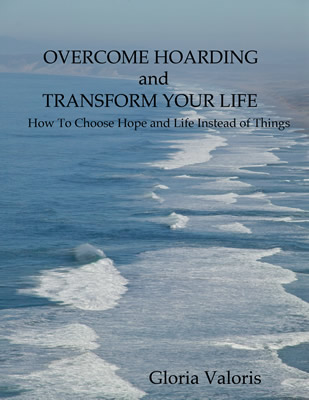Are you a hoarder? If the indicators below apply to you, you need to read this book. |
- Getting rid of things is difficult or impossible or you experience anxiety if something is thrown out. Some examples of common hoarding-indicator emotions include:
- strong attachment to objects that most people would say have no value
- excessive sense of responsibility for the fate of objects
- other people touching your things triggers anxiety or rage
|
- Living conditions are uncomfortable or compromised because of the accumulation. Examples:
- sleeping on the couch because the bed is piled with belongings
- having restricted walkways, entry or fire exits because of piles of objects
- being unable to use the kitchen or bathroom in a normal manner
- having infestations that cannot be controlled because of the volume of
stuff |
- Risking losing or damaging your home, family, finances, health, or life because of your belongings. Examples:
- being at risk for or threatened with divorce or eviction
- being unable to have repairs made to essential fixtures like toilets or sinks
- being in debt from acquiring things you do not use
- being at risk for fire, falls, or falling objects because of piles of things
|
- Acquiring more belongings continues even though your living situation is already difficult or dangerous because of the volume of stuff. Examples:
- adding more things to existing piles
- going into debt buying more things when you already have too many
- bringing in things from the street despite the many risks
|
- Buying great volumes of particular items, far more than could be used in a week, month, or even a year. Examples:
- buying lots of cleaning supplies even though you do little cleaning
- buying many duplicates of the same item of clothing, even though there
are already unworn articles of the same type
- buying duplicates of an item when you have not tried the first one to learn
whether it meets your needs
|
This book will help you solve these problems, and many more, so that you can transform your life from being owned by things to a real life of opportunities, relationships, and experiences.
